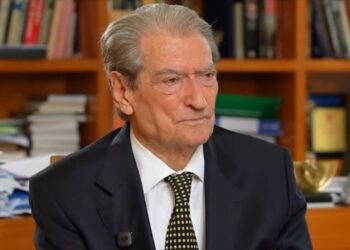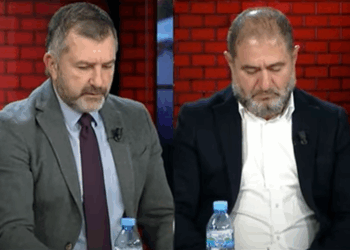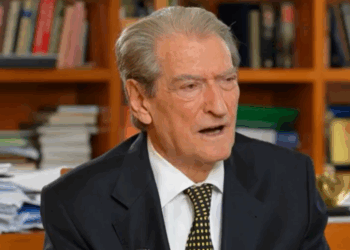By Boldnews.al
Arrest of highly-wanted Arben Frroku in Holland, condemned forever for the murder of Commissar Dritan Lamaj, is again accompanied by major questions.
One day after the public announcement of his arrest in Amsterdam, nobody knows how to officially say how the arrest took place, how was the co-ordination between the Albanian and Dutch institutions and why was the first public to ban his former Prime Minister Sali Berisha .
In the last three years, everything that had to do with the brothers Arben and Mark Frroku, the latter MP until he was arrested as the alleged author of a murder in Belgium, was accompanied by strong controversy over the role of the State Police in the information for them.
Even in the case of arresting Arben Frrok in the Netherlands on Thursday, 28 April 2016, there are still some elements to be clarified. Boldnews.al lists some issues that need clarification:
- Official sources from the General Directorate of State Police confirm that the detention of the convicted Arben Frroku by the Dutch authorities was carried out on 6 March 2016. The Immigration Office at the Schiphol Airport of Amsterdam has escorted a person presented to passport and Greek personalities, Renato Tsepa, dated 1968. The Dutch authorities have doubted that his passport was forged and kept banned until the verifying actions were completed. As a result, the verification of the Dutch authorities ended on 28 April 2016, about 50 days after his detention. The result was: the detainee is Arben Frroku, sentenced to life imprisonment in Albania.
- On 26 April 2016, ie more than a month after his detention, former Prime Minister Sali Berisha stated in a televised interview that Arben Frroku was detained in the Netherlands, associating him with a charge against the State Police, which , according to him, did not take the necessary procedural actions for the full identification and initiation of procedures for extraditing the convicted.
- Boldnews.al has learned from diplomatic sources that the Benelux Chancellery in Tirana has been put into motion immediately to assess the truthfulness of Berisha’s statements. After two days of intensive communication between diplomats in Albania with the Dutch authorities, including Interpol Tirana, it was confirmed that detainee Renato Tsepa was convicted Arben Frroku.
- It is officially learned that Interpol Tirana has communicated only the last two days with their counterparts in The Hague, so they reacted at the same time following Berisha’s statement and the commitment of the Benelux diplomatic offices in Tirana.
- With regard to Arben Frrok’s identification procedure, it is necessary to clarify some essential details of the case. He was detained on March 6, as suspected of holding a forged passport. In any such case, the identifier is the fingerprint of the person. It seems that the procedure has begun, as theoretically, it must be acknowledged that the fingerprints of the convicted Arben Frroku are in the international system as a convicted person with very high social risks.
- Given the fact that the procedure for its identification has lasted for almost two months, while fingerprint scanning only takes a few minutes, then this is the time when the biggest alerts can arise. Or the Dutch authorities have not done it for about 50 days of fingerprint scanning, which sounds rather unrealistic. Or, in the international system of searching persons, Arben Frrok’s fingerprints are not found.
In the announcement of the State Police, broadcast on the media on the evening of April 28, 2016, it is said that “… Interpol Tirana has had some communications with its counterparts in the Netherlands over the last few days (Arben Frrokut case) but only today afternoon it was confirmed that the citizen presented with forged documents under the name “Renato Tsepa” was citizen Arben Frroku, already convicted by Albanian justice … “. So in the official announcement, the police say it only communicated with the Dutch authorities in recent days, while it was detained on March 6th. This statement raises the suspicion that in the international system of people searching, Arben Frrok’s fingerprints have not been at all or have not been accessible by foreign authorities.
In any case, Berisha’s public statement seems to have prompted or forced the authorities to act. Initially, according to diplomatic sources of “Boldnews.al”, there was an immediate commitment of Western diplomacy, which was followed by the rapid actions of Interpol Tirana. But the speed of action has started only in the last three days, while Arben Frroku of 50 days was banned as a suspect with a fake passport under the name Renato Tsepa.














